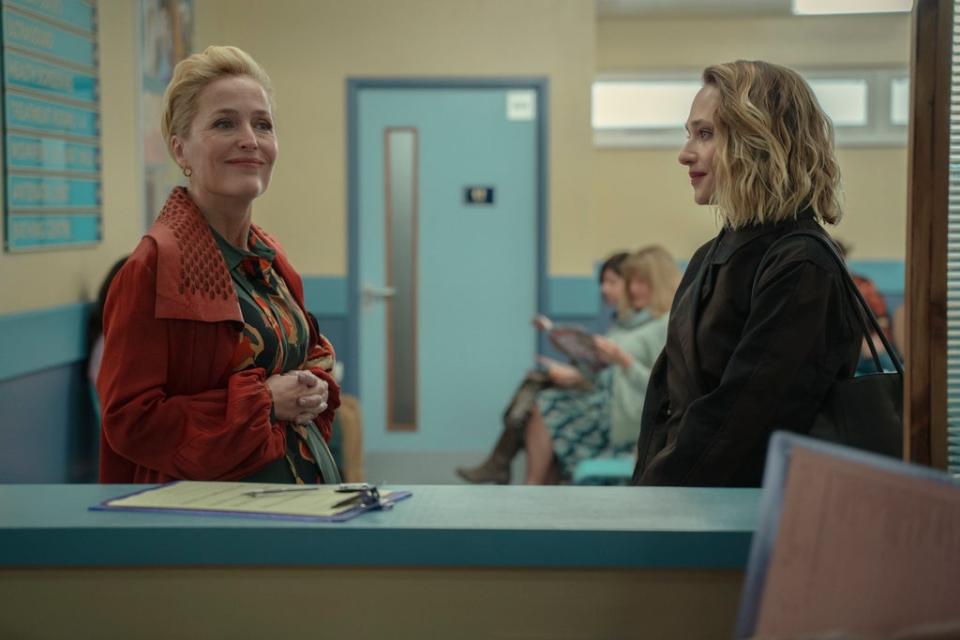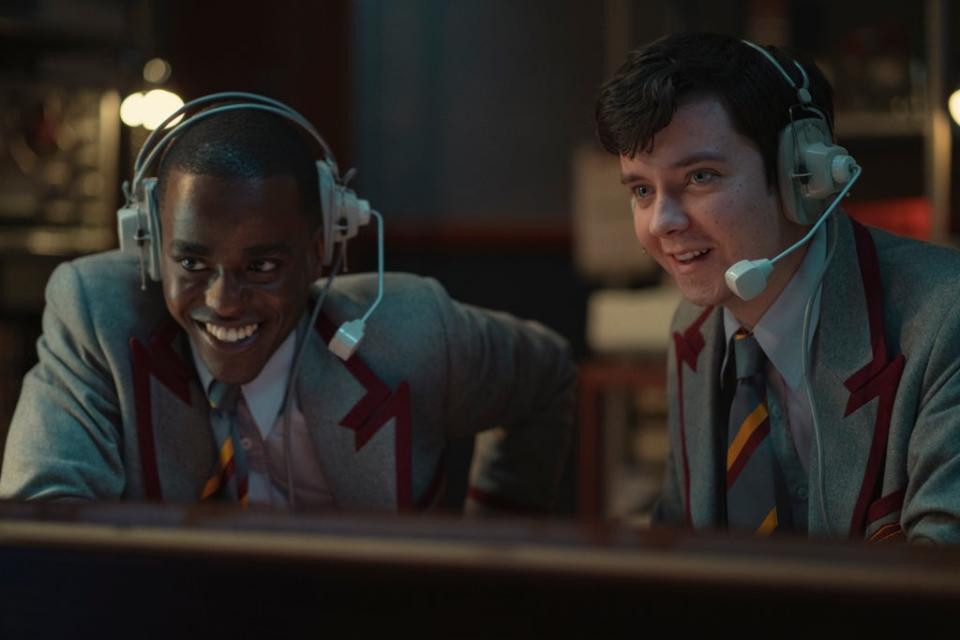Sex Education series 3 review: Darker and more ambitious, but still the show you wish you’d had as a teenager

‘I think we’re alone now,’ croon The Rubinoos, over an epic montage of cross-generational shagging. There is slurping and sucking in suburban homes; lascivious tongues in teenage bedrooms; bobbing bums and wriggling toes poking out from under duvets. It is real, not seedy; the mood is one of panting mutual pleasure. The titles have not yet rolled but you don’t really need them - this is, of course, Sex Education season three.
Life has changed quite a lot since our last outing with the teenagers of Moordale High, a timeless John Hughes-ian universe of letter jackets and conversations by the lockers. Our main man Otis (Asa Butterfield, with a little more swagger) has a moustache and wears purple on Thursdays under strict instructions from new girlfriend Ruby (Mimi Keene). Eric (Ncuti Gatwa, still the standout of the show) and Adam (Connor Swindells) are official. Or at least, they’re making a valiant go of it, when Adam - desperate to remodel himself for Eric - isn’t making a meal of everything, and their relationship is by turns tender and very teenage. Otis and Maeve (Emma Mackey) still aren’t talking, although one suspects from their charged bickering that these two haven’t had their final act quite yet. But for now, she’s making eyes at Isaac (a still brooding George Robinson).

Meanwhile, there’s been a regime change at Moordale. Otis and Maeve’s sex clinic is no more, and they have a new headteacher, Hope Haddon - played, against type, by a simpering, authoritarian Jemima Kirke - a former pupil and zealot who wants to get Moordale back on track after the furore over last term’s chlamydia outbreak. This means uniforms; educational edicts imported from Scandinavian schools; and abstinence-only sex education. When she demolishes the abandoned toilets - still a much-loved HQ for everything from smoking to casual sex to measuring the size of your own penis - the students know it’s war.
And this war is ideological. As Haddon divides Moordale down traditional gender lines, Cal (Dua Saleh), a non-binary classmate, must fight for the space to exist. The students - and teachers - are horrified by the sex education programme; Moordale, once so colourful, soon becomes rendered in shades of greyscale - its walls and lockers painted over, the slate-coloured uniforms scratchy and identikit - under Haddon’s mission.

Writer Laurie Nunn’s storytelling is more ambitious and a little darker this time. Parents cause misery; relationships involve heartbreak, grief and cruelty. Aimee (Aimee Lou Wood) is still struggling with the trauma of her sexual assault; Jackson (low-key leading man Kedar Williams-Stirling) has been deposed as head boy and is fighting off panic attacks that leave him dizzy (so, incidentally, does Cal whom he falls swiftly head-over-heels for).
There’s balance too, like all the best teen-adjacent dramas (see: The OC), in the sense that the kids’ fallible parents are ineptly managing their own chaos: Otis’s mother Jean (an always excellent Gillian Anderson) is pregnant with Jakob’s child; he and daughter Ola have moved into their house, to play at being a happy family (note that this involves exes Ola and Otis becoming siblings). Nothing, small or big, is easy: she cackles when he wants to call the baby Thor; he tells her, quietly that it was his father’s name. The downfall of the formerly hateful Mr Groff (Alistair Petrie) is a Thomas Hardy-esque tragedy. There is a scene-stealing turn by a delightfully awful Jason Isaac - Groff’s brother, and everything Groff is not (successful; rich; not living on a former colleague’s sofa).

The magic of the show remains that nothing ‘heavy’ ever feels hectoring, tokenising or clumsy. In fact, the lightness of touch does it all - a scene in the male locker room explores the fragility of teen male identity better than any hand-wringing columnist ever could - and there’s still plenty of pure slapstick (see: the scene where a desperate teen boy ends up marooned in front of the science block, totally starkers, except for the goat he’s grabbed to preserve the last of his modesty. The goat, of course, is Aimee and her boyfriend Steve’s ‘commitment goat’). There are mishaps with strawberry condoms; a counterfeit sex clinic run by stoner Kyle - aka The Sex King - who cribs his notes from porn (“jizz on face”, reads one observation); and a Ruby/Otis and Adam/Eric double-date that’s so awkward it takes you right back to your own exploits down the Megabowl.
It’s still the series you wish you’d had when you were a pained and painful teenager, muddling through, obsessed with trying to be ‘normal’; in fact, sometimes - just for an hour or so - it makes you wish you still wish you were.
Sex Education series three is on Netflix now. Creator Laurie Nunn and cast members George Robinson (Isaac) and Chinenye Ezeudu (Viv) will be speaking at the Evening Standard Stories Festival, in association with Netflix, September 24-26. Head to stories.standard.co.uk to book and find out more about the line-up
Read More
What to watch this week, from Help to Sex Education
The Morning Show season two review: It’s back - with more substance
Help review: Comer and Graham shine in powerful pandemic drama

 Yahoo News
Yahoo News 